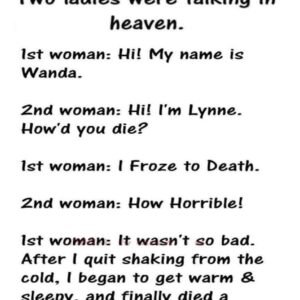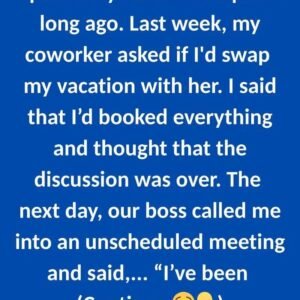My husband held my hand and the hospital photo showed us smiling—new baby, big brother, and us. The nurse gave me the discharge paperwork, and I saw a name under “Emergency Contact” that I didn’t know.
I asked, and my spouse became pale. The speaker hesitated before stating, “It’s… Someone from work. Only protocol. I didn’t care.”
Air felt like it fled the room. My hand softened in his. “Someone from work? Why would you post your work emergency contact when you have a wife and two kids?
He stumbled, unprepared for the surprise. Not like that, Sarah. The situation is complex.
Sensing tension, the nurse apologized awkwardly. My heart was racing as I held the sleeping baby. “Do you need to tell me?” I asked quietly to avoid disturbing our son, who was playing with a balloon at the foot of the bed.
I had seen him stroke the back of his neck a hundred times when frightened. Her name is Alana. Logistics is her job. When tensions were high, we became close.
“Tense?” I echoing, feeling betrayal swelling. “Tense how?”
His seat was the small plastic chair beside the window. “You withdrew after your miscarriage last year. I didn’t know how to help. Her only response was listening. She knew my marriage. I swear nothing happened.”
I attempted to breathe as I stared down at our newborn, still pink and warm from delivery. “Why is she your emergency contact?”
He was slow to respond. That quiet conveyed more than everything he could.
After returning home, I couldn’t sleep. I imagined the man snoring beside me as I watched our newborn in his cradle and our five-year-old in his dinosaur bedding. It wasn’t TV-style cheating. Hotel receipts and lipstick marks were absent. It was something. It hurt.
After a few days, I asked again. I required every info. I asked him directly, “Did you have an emotional affair with her?” at the kitchen table after the kids went to bed.
He paused, then nodded. “Yes. But that was it.”
I appreciated the honesty, but the damage was done. Did you adore her?
“No,” he rushed. “She made me feel seen. You ignored me. I felt like drowning.”
Actually, I was remote. After the miscarriage, I hid my emotions and pretended to be fine. I was building a new life inside me to recover from grief and fear.
“I should’ve said something,” I muttered. “You should’ve, too.”
We sought counseling. I wouldn’t abandon a marriage without a struggle. I wouldn’t forget what I knew either.
Everything spilled in therapy. He panicked and contacted her when I was in labor because he didn’t know if he could be a dad again. She remained silent. That was why her name was fresh on the form.
Sometimes emotional connection was more harmful than physical betrayal. When I needed him most, he went to someone else for consolation.
A session hit me hard. The therapist said, “Sarah, do you feel safe with him now?”
I remained silent. I didn’t know.
Weeks became months. He strived to make dinner, leave notes in my handbag, and nurse the baby early in the morning so I could relax. He was trying to regain my trust. My feelings for him returned. Another part was guarded.
I found a little notebook while collecting old paperwork for the baby one morning. He handwrote entries. Not notes to me. He wrote me letters with things he wanted to express but was afraid to say.
“I miss us before we broke,” read one page. I’m not after Alana. I want us. But I doubt I deserve it.”
Sitting on the floor, I wailed.
Next day, I packed a little bag, left the kids with my sister, and drove to the shore. I needed time to contemplate.
An elderly woman chatted at a seaside café. She kindly questioned, “Are you running from something or toward something?” I must have looked a disaster.
Bitter laughter. “Both, I think.”
She nods. “Remember that truth is always in the middle.”
Two days later, my hubby looked exhausted when I arrived home. “I thought you were leaving for good,” he remarked.
“I thought I might be,” I said. “But I’m not ready to decide.”
We spoke again that night, but differently. We did not defend or accuse. Just chatted. I discovered I still loved him. He still loved me. It didn’t move. It was buried recently.
We started over. Not dramatically. Small steps. Walks after dinner. Monthly date nights. We exchanged journals, jotting notes when words were hard.
Months later, Alana messaged me on Facebook. I nearly didn’t open it.
But curiosity triumphed.
Hello Sarah. I apologize, even though you owe me nothing. I should never have let things grow so close. He often spoke about your strength and admiration. Not then, but now. I hope you’re okay. I’m moving to Oregon for work and improving myself. Peace to you.”
I didn’t reply. My anger subsided for the first time. I felt free.
On our anniversary in spring, my husband took me to the beach where I thought. He remarked, “Thank you for not giving up on us.” while we strolled barefoot on the shore.
He was older, exhausted, but still my husband. “Thanks for finally arriving.”
A few months later, I learned something surprising. Our five-year-old wrote The Family That Nearly Broke But Didn’t in school. His teacher sent it home in a crimson folder, praising its potency.
He wrote of a storm-shaking house. The roof nearly collapsed, the windows cracked, yet the people within held hands and waited.
Reading it made me cry. Kids know more than we assume.
Not everything was fixed. We still fought, tired, and messed up. Now we confronted it together. Not split.
The ultimate turning point was our baby’s first steps. My spouse caught him before he fell. I realized—this man might stumble, but he wouldn’t let us fall again.
Our loved ones may hurt us out of fear, misunderstanding, or grief. Although not okay, that makes it human.
Every day, we can allow love bloom in the cracks or let them ruin the foundation.
My choice was rebuild.
Perhaps most surprising was that love felt stronger—not because it was flawless, but because it had been tested.
Have you ever been startled by forgiveness—giving or receiving? If this story moved you, like and share.




